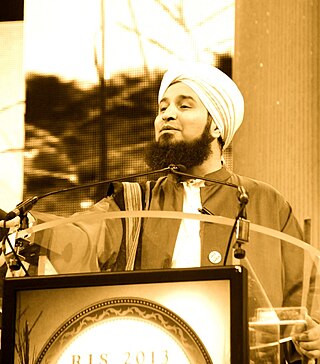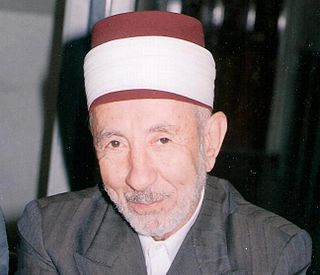
The Deobandi movement or Deobandism is a revivalist movement within Sunni Islam that adheres to the Hanafi school of law. It formed in the late 19th century around the Darul Uloom Madrassa in Deoband, India, from which the name derives, by Muhammad Qasim Nanautavi, Rashid Ahmad Gangohi, and several others, after the Indian Rebellion of 1857–58. They consider themselves the continuation of Ahlus Sunnah wal Jamaat. The main purpose of this movement was to reject the grave worshipping, shirk and protect the orthodoxy of Islam from Bidah, as well as the influence of non-Muslim cultures on the Muslim of South Asia. The movement pioneered education in religious sciences through the Dars-i-Nizami associated with the Lucknow-based ulema of Firangi Mahal with the goal of preserving traditional Islamic teachings from the influx of modernist, secular ideas during British colonial rule. The Deobandi movement's Indian clerical wing, Jamiat Ulema-e-Hind, was founded in 1919 and played a major role in the Indian independence movement through its participation in the Pan-Islamist Khalifat movement and propagation of the doctrine of composite nationalism. The movement shares several similarities with Wahhabism.

In Islam, the ulama, also spelled ulema, are scholars of Islamic doctrine and law. They are considered the guardians, transmitters, and interpreters of religious knowledge in Islam.
Ijmāʿ is an Arabic term referring to the consensus or agreement of the Islamic community on a point of Islamic law. Sunni Muslims regard ijmā' as one of the secondary sources of Sharia law, after the Qur'an, and the Sunnah. Exactly what group should represent the Muslim community in reaching the consensus is not agreed on by the various schools of Islamic jurisprudence. Some believe it should be the Sahaba only; others the consensus of the Salaf ; or the consensus of Islamic lawyers, the jurists and scholars of the Muslim world, i.e. scholarly consensus; or the consensus of all the Muslim world, both scholars and lay people. The opposite of ijma is called ikhtilaf.
A madhhab also spelled as mazhab, is a school of thought within fiqh.
In Shia Islam, the Imamah is a doctrine which asserts that certain individuals from the lineage of the Islamic prophet Muhammad are to be accepted as leaders and guides of the ummah after the death of Muhammad. Imamah further says that Imams possess divine knowledge and authority (Ismah) as well as being part of the Ahl al-Bayt, the family of Muhammad. These Imams have the role of providing commentary and interpretation of the Quran as well as guidance.

Islam is the largest and the state religion of the Islamic Republic of Pakistan. Pakistan has over 240 Million adherents of Islam. As much as 90% of the population follows Sunni Islam. Most Pakistani Sunni Muslims belong to the Hanafi school of jurisprudence, which is represented by the Barelvi and Deobandi traditions.

Shaykh Ahmad bin Zayn al-Dín bin Ibráhím al-Ahsá'í, commonly known as Shaykh Ahmad or al-Ahsá'í, was a prominent Shia Muslim theologian and jurist who founded the influential Shaykhí school of Twelver Shiism, which attracted followers from throughout the Persian and Ottoman Empires.
Islamic religious leaders have traditionally been people who, as part of the clerisy, mosque, or government, performed a prominent role within their community or nation. However, in the modern contexts of Muslim minorities in non-Muslim countries as well as secularised Muslim states like Turkey, and Bangladesh, the religious leadership may take a variety of non-formal shapes.

Bihar al-Anwar is a comprehensive collection of traditions (ahadith) compiled by Shia scholar Mohammad-Baqer Majlesi, known as Allama Majlisi. It is a hadith collection as the secondary source used beside the Four Books. Bihar al-Anwar which a compendium of Hadiths, historical subjects and commentaries on many Qur'anic verses, completed between 1106 AH and 1110 AH.
Shah Abdul Aziz Muhaddith Dehlavi was an Indian Sunni Muslim Scholar and Sufi Saint. He is known as the Muhaddith and Mujaddid from India. He was of the Naqshbandi Sufi order which emerged from a tradition of violent backlash against the modernization of Sunni culture. This tradition inspired later Sunni scholarship, including Aziz's father Shah Waliullah Dehlawi. Aziz's dream was to declare India a Darul Harb.
The Shia view of the Qur'an differs from the Sunni view, but the majority of both groups believe that the text is identical. While some Shia disputed the canonical validity of the Uthmanic codex, the Shia Imams always rejected the idea of alteration of Qur'an's text. Only seven Shia scholars have believed in omissions in the Uthmanic codex.
After the death of Muhammad in 632, a group of Muslims, who would come to be known as the Sunnis, believed that Muhammad's successor as caliph of the Islamic community should be Abu Bakr, whereas a second group of Muslims, who would come to be known as the Shias, believed that his successor should have been Ali. This dispute spread across various parts of the Muslim world, which eventually led to the Battle of Jamal and Battle of Siffin. Sectarianism based on this historic dispute intensified greatly after the Battle of Karbala, in which Husayn ibn Ali and some of his close partisans, including members and children of the household of prophet, were killed by the ruling Umayyad Caliph Yazid I, and the outcry for revenge divided the early Islamic community, albeit disproportionately, into two groups, the Sunni and the Shia. This is known today as the Islamic schism.

Shia Islam in Iraq has a history going back to the times of Ali ibn Abi Talib, the first imam of Shia Islam and fourth caliph of Sunni Islam who moved the capital of the early caliphate from Medina to Kufa two decades after the death of Muhammad. Today, Shia Muslims make up the majority of the Iraqi population. Iraq is the location of the holy cities of Najaf and Karbala, pilgrimage sites for millions of Shia Muslims. Najaf is the site of Ali's tomb, and Karbala is the site of the tomb of Muhammad's grandson, third Shia imam Husayn ibn Ali. Najaf is also a center of Shia learning and seminaries. Two other holy sites for Twelver Shia in Iraq are the Al-Kadhimiya Mosque in Baghdad, which contains the tombs of the seventh and ninth Shia Imams and the Al-Askari Mosque in Sāmarrā, which contains the tombs of the tenth and eleventh Shia Imams.
The Safavid conversion of Iran to Shia Islam was a process of forced conversion that took place roughly over the 16th through 18th centuries and turned Iran (Persia), which previously had a Sunni majority population, into the spiritual bastion of Shia Islam. It was a process that resulted in hostility with Iran's Sunni neighbours, most notably the Ottoman Empire. The conversion also ensured the dominance of the Twelver sect within Shiism over the sects of Zaidiyyah and Isma'ilism – each of whom had previously experienced their own eras of dominance within Shi'ism. Through their actions, the Safavids reunified Iran as an independent state in 1501 and established Twelver Shi'ism as the official religion of their empire, marking one of the most important turning points in the history of Islam.

Habib Ali Zain al-Abidin al-Jifri is a Yemeni Sunni Hanafi Islamic scholar and spiritual educator based in the United Arab Emirates. He is the founder of Tabah Foundation, a research institute based in Abu Dhabi, UAE. He is a direct descendant of the Islamic prophet Muhammad.
Sectarian violence among Muslims is the ongoing conflict between Muslims of different sects, most commonly Shias and Sunnis, although the fighting extends to smaller, more specific branches within these sects, as well as Sufism. It has been documented as having gone on from Islam's beginnings up until contemporary times.
Salman Husaini Nadwi is an Indian scholar and professor in the Islamic sciences. He is an author of numerous scholarly works in Arabic and Urdu. Salman Nadwi served as the Dean of the Faculty of Dawah at the Darul-uloom Nadwatul Ulama madrasa in Lucknow.

Anti-Shi'ism is hatred of, prejudice against, discrimination against, persecution of, and violence against Shia Muslims because of their religious beliefs, traditions, and cultural heritage. The term was first used by Shia Rights Watch in 2011, but it has been used in informal research and written in scholarly articles for decades.

Muhammad Said Ramadan Al-Bouti was a renowned Sunni Muslim scholar, writer, and professor from Syria, where he was vice dean in Damascus University and served as imam of the Umayyad Mosque.
The 2016 conference on Sunni Islam in Grozny was convened to define the term "Ahl al-Sunnah wa al-Jama'ah", i.e. who are "the people of Sunnah and majority Muslim community", and oppose Takfiri groups. The conference was held in the Chechen Republic capital of Grozny from 25 to 27 August 2016, sponsored by the president of Chechnya, Ramzan Kadyrov, and attended by approximately 200 Muslim scholars from 30 countries, especially from Russia, Egypt, Syria, Libya, Kuwait, Sudan, Jordan, etc. at the invitation of Yemeni Sufi preacher, Ali al-Jifri.








